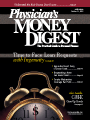Publication
Article
Physician's Money Digest
Search for Independent Stock Research
Author(s):
New York Times
Last April, a $1.4-billion settlement reached among federal and state regulators and 10 major securities firms included $432 million to finance independent stock research. According to a article, the agreement required the Wall Street firms to take measures to ensure the objectivity of their own research, as well as provide investors with additional research from independent firms. The details of the settlement are still subject to final approval by Federal District Judge William H. Pauley III in New York City.
Times
Independent research firms are positioning themselves to be the stock resource of choice. Their track record at providing better stock recommendations than some large Wall Street firms has been documented. According to the article, Investars, a tracking service, reviewed the performance of model stock portfolios based on the firms' stock recommendations from July 25, 2000, through July 24, 2003. It found that 4 of the top 5 and 6 of the top 10 performers during that period were independent researchers.
Individual Investors
Most independent firms have catered to large institutions, selling their research for fees ranging from $25,000 to more than $100,000 annually. However, a number of firms have been offering independent stock research for individual investors for quite some time. They include Morningstar (800-735-0700; www.morningstar.com), the National Association of Investors Corporation (877-275-6242; www.better-investing.org), Standard & Poor's (800-523-4534; www.spoutlookonline.com), and Value Line (800-634-3583; www.valueline.com).
Morningstar began offering stock analysis about 5 years ago on approximately 1000 stocks and plans to add 10 analysts to its stock-research staff this year. Value Line offers analysis and investment recommendations on 8300 stocks. Their annual fees range from $39 to $570, but some free information is also available.
Because they're independent, these firms tend to be more critical and objective than Wall Street analysts of the companies they cover. However, as Kenneth Janke, president of the National Association of Investors Corporation, points out, the fact that a research firm is independent doesn't guarantee the quality of its research. Investors still need a better way to evaluate the research they receive, which may happen.
Glut of Information
Times
Thomson Financial has announced that it will publish In Context Reports. These reports will use data from more than 1000 research firms to illustrate how analysts stack up against their peers and whether the analysts have worked for firms with possible investment banking conflicts. The article states that companies like Investars that track analyst performance want to sell subscriptions to Wall Street firms for distribution to investors. The settlement agreement requires Wall Street firms to publish their stock ratings and price-target forecasts on the Web for investors to compare recommendations.
Independent physician-investors should prepare themselves for what could soon become a glut of information. Some analysts believe too much information is better than biased information. Others are more skeptical, noting that many of the firms moving to take advantage of the agreement settlement lack a history of providing research, and as such, their research should be taken with a grain of salt. They advise independent investors to stick to diversified mutual funds rather than trying to be stock pickers.
That hasn't stopped investors from plunging into the market. They doubt that research supplied by Wall Street will ever be truly unbiased, and crave independent research from firms who can clearly demonstrate their lack of bias.
